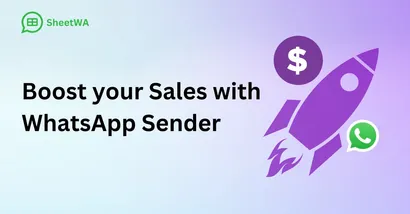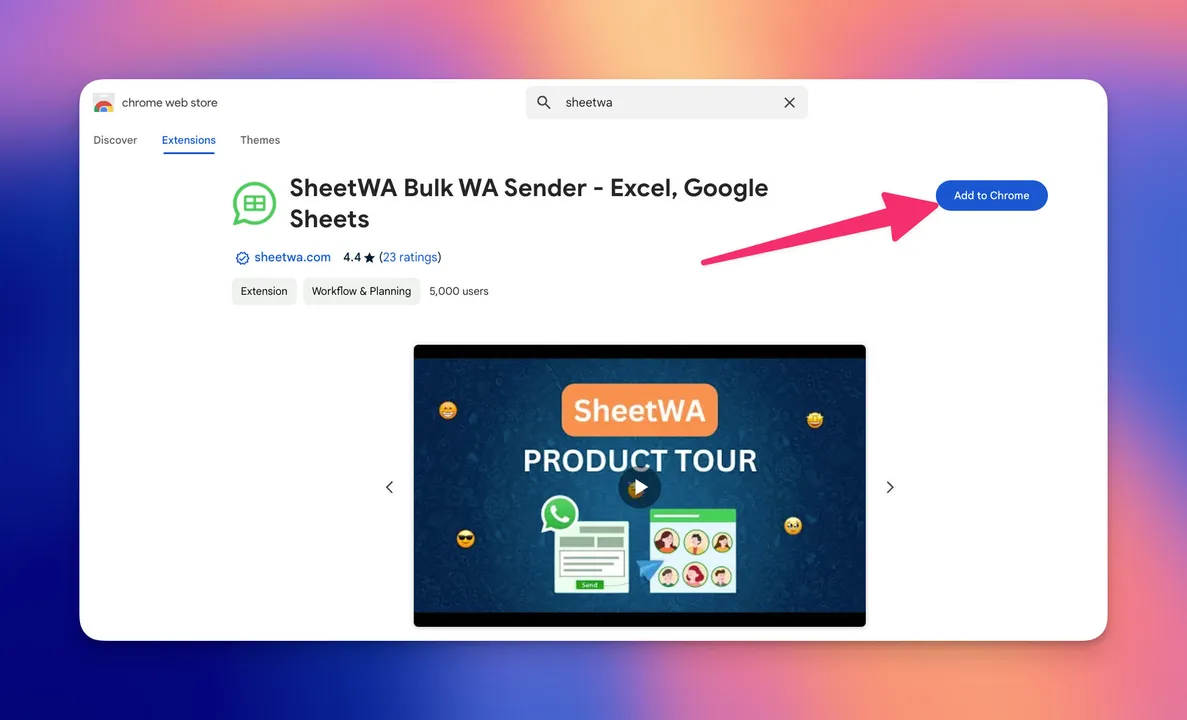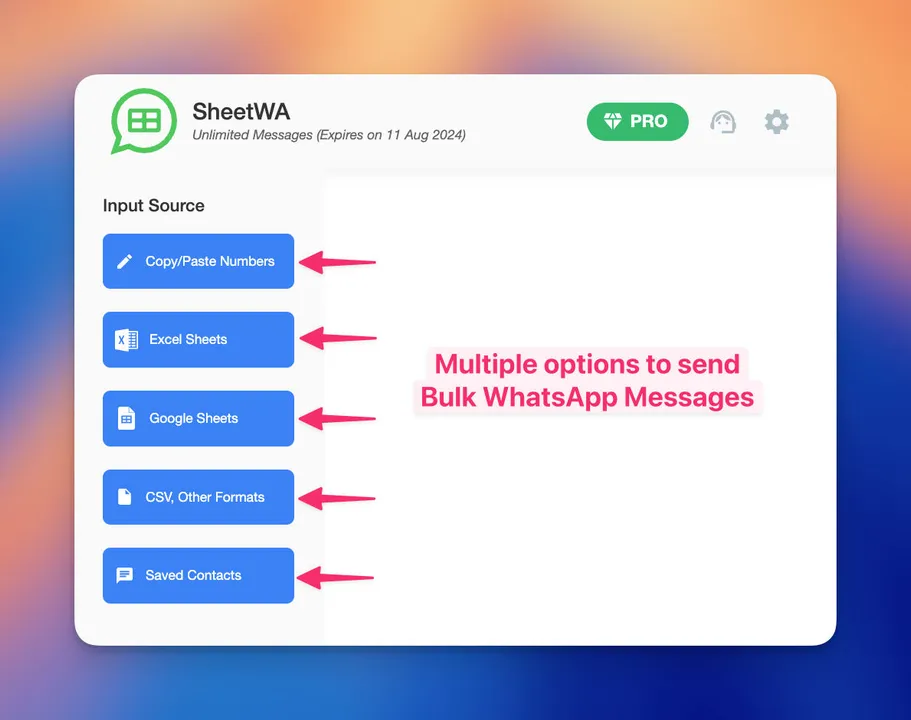
Introduction
In today’s digital-first world, businesses need efficient communication channels to stay connected with customers and maximize sales. With over 2 billion users globally, WhatsApp has emerged as an essential platform for business communication. This guide explores the strategies and benefits of using a WhatsApp Sender to streamline your marketing efforts, reach larger audiences, and drive sales.
Key Takeaways
Discover the impact of WhatsApp marketing on business growth.
Learn how to set up and utilize a WhatsApp Sender effectively.
Get tips on crafting personalized messages, implementing call-to-actions, and leveraging automation for optimal results.
Understanding the Power of WhatsApp Marketing

The way people communicate has transformed significantly over the years, with WhatsApp now playing a key role in connecting businesses with consumers. Leveraging WhatsApp marketing enables businesses to:
Communicate directly with customers
Foster personal engagement
Build brand loyalty through timely and relevant messaging
Importance of Utilizing WhatsApp Sender

Manually sending messages to individual prospects can be tedious and time-consuming. A WhatsApp Sender streamlines this process, allowing businesses to:
Reach a larger audience at once
Save time by automating messages
Maximize campaign effectiveness with bulk messaging
I. Getting Started with WhatsApp Sender
A. Installing and Setting Up the Software
1. Downloading WhatsApp Sender
Visit the official website of a trusted WhatsApp Sender provider (e.g., SheetWA) to download the software. Opt for a reliable tool to ensure secure and effective marketing.

2. Software Installation Guide
Follow the user-friendly installation guide provided by the platform. The process requires minimal technical expertise and typically takes only a few minutes.
3. Configuring Your Account and Registration Process
Complete the registration by filling out the required information to unlock the features of the WhatsApp Sender.
B. Importing and Organizing Your Contacts
1. Preparing Your Contact List
Organize your contact list by removing duplicates, updating outdated information, and segmenting contacts based on demographics or behavior.
2. Importing Contacts
Upload your contact list into the WhatsApp Sender in compatible formats like CSV or Excel.

3. Grouping and Segmenting Contacts
Use segmentation features to categorize contacts, enabling personalized marketing tailored to specific customer groups.
II. Crafting Compelling Sales Messages

A. Understanding the Psychology of Effective WhatsApp Messages
1. Importance of Personalization and Customization
Personalize messages by addressing recipients by name and tailoring content to their preferences to foster stronger connections.
2. Crafting Attention-Grabbing Messages
Compose concise, intriguing subject lines to capture attention immediately.
3. Optimizing Message Length and Tone
Keep messages brief, focused, and aligned with your brand’s voice to maintain engagement.
B. Incorporating Media and Visuals into Your Messages
1. Utilizing Images and Videos for Engagement
Enhance engagement by using high-quality images and videos to communicate your message visually.
2. Creating Attractive Product Images
Highlight unique product features and benefits through visually appealing images that encourage purchases.
3. Using Short Videos to Showcase Product Features
Create brief, engaging videos that demonstrate how your products solve problems or add value.
C. Implementing Effective Call-to-Actions (CTAs)
1. Designing Clear and Concise CTAs
Incorporate action-oriented CTAs that prompt recipients to take specific actions, such as purchasing or signing up.
2. Utilizing Urgency and Scarcity
Create urgency with limited-time offers or exclusive discounts to motivate immediate actions.
3. Measuring and Analyzing CTA Success
Track metrics like clicks and conversions to assess CTA effectiveness and refine future campaigns.
III. Executing Effective WhatsApp Marketing Campaigns

A. Scheduling and Automating Messages
1. Setting Up Message Scheduling
While SheetWA does not support direct scheduling, prepare messages for manual, timely sending to target optimal engagement periods.
2. Automating Messages
Use automation to send messages triggered by customer actions or events, delivering timely, personalized communication.
3. Ensuring Compliance with Spam Regulations
Adhere to spam regulations by obtaining user consent and delivering relevant content to maintain trust and credibility.
B. Monitoring and Analyzing Campaign Performance
1. Tracking Sent Messages and Delivery Status
Monitor message delivery to identify any failed sends and ensure that messages reach intended recipients.
2. Analyzing Open and Click Rates
Use analytics tools to measure open and click rates, gaining insights into engagement and refining content accordingly.
3. Using Analytics to Optimize Campaigns
Leverage data insights to identify patterns, strengths, and areas for improvement, maximizing campaign performance.
C. Personalization and Segmentation Strategies
1. Customizing Messages for Different Customer Segments
Segment contacts based on demographics or purchase history to deliver highly relevant and engaging messages.
2. Creating Targeted Offers
Tailor offers to specific customer groups, boosting conversion rates through relevant, appealing incentives.
3. Implementing Follow-Up Strategies
Re-engage interested recipients with follow-ups, providing additional information or personalized offers to encourage conversions.
IV. Best Practices for Successful WhatsApp Sales Boosting

A. Maintaining Trust and Avoiding Spamming
1. Understanding WhatsApp's Anti-Spam Policies
Respect user preferences by avoiding unsolicited messages and focusing on delivering valuable content.
2. Obtaining Customer Consent for Messages
Request opt-in consent, clearly explaining the value recipients will receive, which builds trust and fosters engagement.
3. Providing Unsubscribe Options
Allow recipients to unsubscribe easily, reinforcing transparency and customer-centricity.
B. Establishing and Nurturing Customer Relationships
1. Building Genuine Connections with Customers
Adopt a friendly tone and respond promptly to inquiries, showing genuine interest in meeting customer needs.
2. Personalizing Communication for Individual Customers
Personalize interactions by remembering past conversations, making customers feel valued.
3. Follow-Up Strategies for Repeat Business
Implement follow-up messages to thank customers post-purchase, strengthening relationships and encouraging repeat business.
C. Keeping Up with WhatsApp Marketing Trends
1. Staying Updated with WhatsApp Features
Adapt to new WhatsApp features, such as interactive catalogs, to keep your marketing strategies current and engaging.
2. Benchmarking Competition and Industry Trends
Analyze competitor strategies and industry trends for insights to refine your approach.
3. Experimenting with New Techniques
Try different messaging styles, formats, and strategies to discover innovative ways to engage your audience.
V. Summary
A. Recap of Using WhatsApp Sender to Boost Sales
Using a WhatsApp Sender like SheetWA can significantly enhance sales by reaching a broader audience and facilitating efficient, personalized communication. This guide has outlined key strategies to help you utilize WhatsApp effectively.
B. Key Takeaways for Implementing Effective WhatsApp Marketing
Success in WhatsApp marketing involves personalizing messages, using engaging media, implementing clear CTAs, and analyzing campaign performance for continuous improvement.
C. Future Potential and Growth of WhatsApp Marketing
As WhatsApp continues to grow, its potential as a powerful marketing tool remains immense. By staying current with trends and leveraging WhatsApp’s unique features, businesses can maximize sales and connect personally with their customers.
Frequently Asked Questions (FAQs)
Q: Can WhatsApp Marketing be used for B2B Sales?
A: Yes, WhatsApp marketing is effective for B2B sales, enabling direct, personalized communication with potential clients and fostering professional relationships.
Q: Is WhatsApp Sender a Legal Marketing Tool?
A: WhatsApp Senders are legal as long as they adhere to WhatsApp’s policies. It’s crucial to obtain consent and respect privacy to ensure compliance.
Q: How can I manage customer responses efficiently?
A: Utilize automation features to set up predefined replies for common inquiries, ensuring prompt support while reserving resources for personalized responses when needed.
